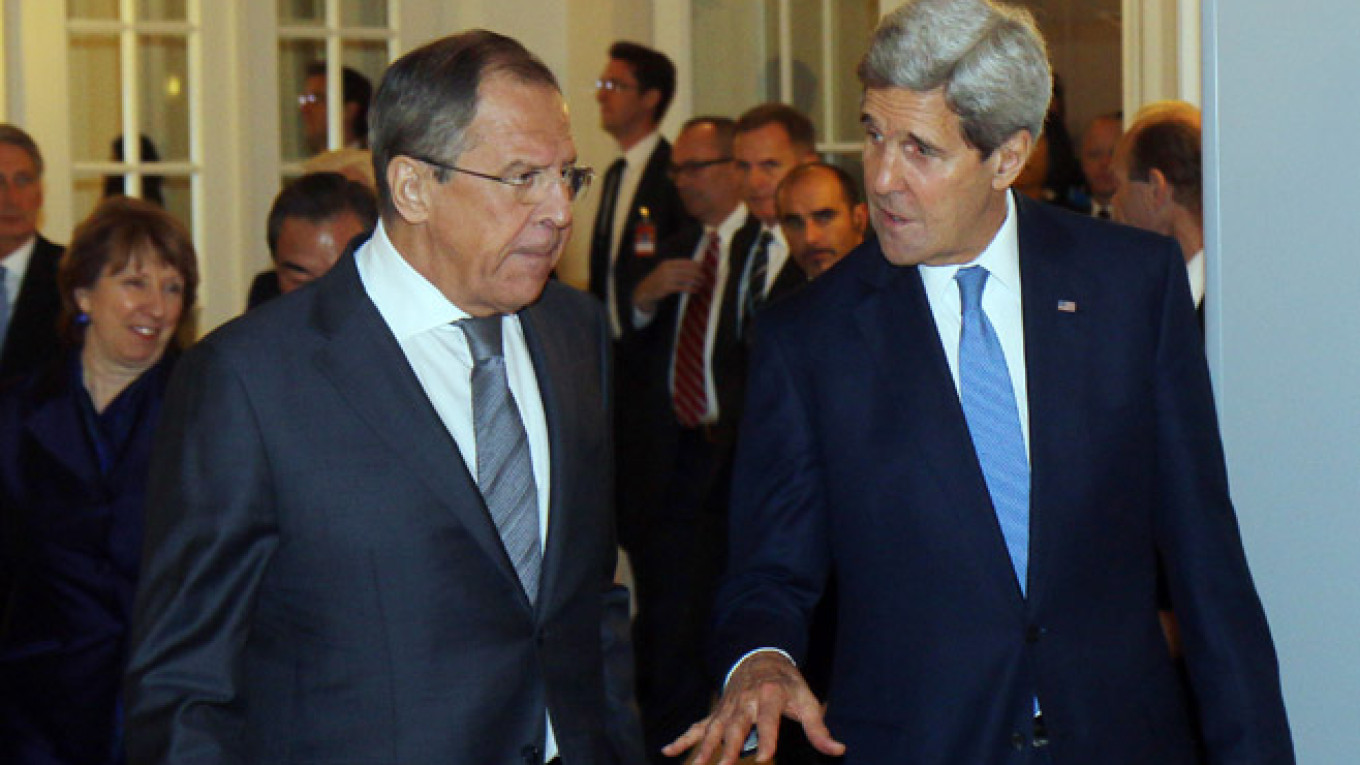As Monday's negotiations on Iran's nuclear program failed to yield a deal and resulted in Iran, Russia, the U.S., China, Britain and Germany setting a new deadline of July 1, analysts hailed the talks as a rare remaining area of cooperation between Russia and the West.
The U.S. recognizes the need in the process for Russia — which has traditionally acted as a mediator in negotiations that have been repeatedly hindered by mutual accusations between Iran and the U.S. — and therefore has not questioned its role despite the ongoing conflict in Ukraine, analysts told The Moscow Times.
"It seems like the nuclear talks are one of the only avenues where the U.S. and Russia still see more or less eye-to-eye. It is therefore an area of cooperation for the two countries amid the Ukraine crisis," Ariane Tabatabai, an associate with Harvard University's Belfer Center for Science and International Affairs, said in e-mailed comments.
"Both Russia and the U.S. recognize that this is a very important issue that cannot suffer due to disagreements in other regions," Anton Khlopkov, director of the Moscow-based Center for Energy and Security Studies, said in a phone interview. ?
Foreign Minister Sergei Lavrov said Monday that "substantial progress had been made," adding that in three or four months the parties would agree on the "basic principles" of the comprehensive agreement on the nuclear program, according to a transcript published on the ministry's website.
Before the talks were adjourned, a senior Iranian official was cited by Reuters as saying that the alternative would be to look to Russia and China for a possible solution.
"We have always had good relations with Russia and China. Naturally, if the nuclear talks fail, we will increase our cooperation with our friends and will provide them with more opportunities in Iran's high-potential market," the official was quoted as saying on condition of anonymity.
"We share common views [with Russia and China] on many issues, including Syria and Iraq," he said.
Power Plant Partners
Russia and Iran agreed on Nov. 11 to build two new nuclear power reactors next to the Bushehr plant that was completed by Russia in 2011. The possible construction of six more power reactors was also discussed.
During the plant's construction, Russia made it a condition that Iran should buy all its reactor fuel from Russia. Iran, however, continued its own uranium enrichment process, saying that it also needs it for medical purposes.
The ongoing negotiations mainly concern the number of centrifuges that are used to enrich uranium at supersonic speed. The Western powers are seeking to lengthen the "breakdown time" Iran would need in order to develop enough fissile material for a nuclear weapon. The U.S. wants that time period to be one year, while Israel and Saudi Arabia — which are not included in the talks — have called for two years.
Ambiguous Outcome
In the wake of the talks, many analysts have pointed out that Russia would actually benefit if the negotiations fail, since if a deal is reached and sanctions on Iran are lifted, its oil would hit the global market, depreciating the price of Russia's main export.
At the same time, according to Vladimir Yevseyev, director of the Center of Social and Political Studies in Moscow, Russia wants the negotiations to move forward to create a "positive background" for negotiations on other issues, including Ukraine.
"A deal on Ukraine is currently being negotiated out of the public eye, so there is an understanding that it is better to avoid aggravating the situation," he said.
In addition, Russia needs the negotiations between the six parties to continue, as otherwise its nuclear plant and other Iran projects could be jeopardized, according to Khlopkov.
Solidarity in Sanctions
One of the main questions in the Iran nuclear talks was what form of sanctions relief could be provided in the event of an agreement being reached. The U.S. has led the West in using sanctions to affect Iran's policies since the Middle Eastern country's 1979 Islamic Revolution.
Russia is now subject to sanctions itself, as the international community attempts to influence its policies on Ukraine.
"It is true that sanctions pushed Iran to compromise and influenced President Hassan Rouhani, but they were not decisive," Yevseyev said.
"It's not possible to bring about regime change in Iran using sanctions," he said.
Lavrov said Saturday at a meeting of the Council on Foreign and Defense Policy that the aim of Western sanctions against Russia is to effect regime change in Moscow.
Contact the author at [email protected]
A Message from The Moscow Times:
Dear readers,
We are facing unprecedented challenges. Russia's Prosecutor General's Office has designated The Moscow Times as an "undesirable" organization, criminalizing our work and putting our staff at risk of prosecution. This follows our earlier unjust labeling as a "foreign agent."
These actions are direct attempts to silence independent journalism in Russia. The authorities claim our work "discredits the decisions of the Russian leadership." We see things differently: we strive to provide accurate, unbiased reporting on Russia.
We, the journalists of The Moscow Times, refuse to be silenced. But to continue our work, we need your help.
Your support, no matter how small, makes a world of difference. If you can, please support us monthly starting from just $2. It's quick to set up, and every contribution makes a significant impact.
By supporting The Moscow Times, you're defending open, independent journalism in the face of repression. Thank you for standing with us.
Remind me later.


